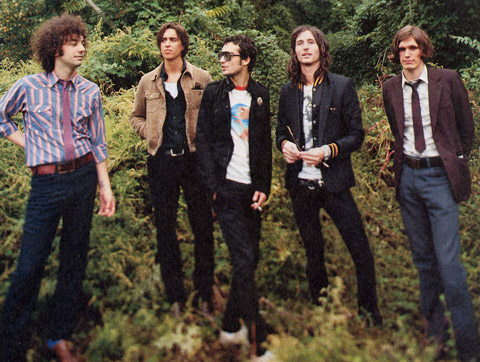
BARELY LEGAL The Strokes quickly corrected the trainwreck of late-’90s culture and erased Fred Durst from magazine covers. |
Let's face it: popular music, as a phenomenon, is a lie. If our musical idols, stripped of their varying mythologies, are just guys and gals with guitars, microphones, and tight-fitting pants, then hype is the engine of that mythology, turning scrawny humans with pouty lips into the Voices of Their Generations. But it's the lie we crave: that the Beatles taught us how to love, that the Pistols taught us to be fierce, and that the Strokes — with their debut long-player released 10 years ago this week — corrected the trainwreck of late-'90s mass culture, delivering us from a nu-metal and boy-band purgatory into a sleek and sexy modern age.
Part of the cool of the Strokes comes down to the fact that they blew up in the UK first: a few years of kicking around in NYC clubs did zip until their demo got into the hands of Rough Trade, who in turn flipped those tunes over to the NME, who were desperate to hype someone, anyone, who wasn't Fred Durst. They were good-looking, insouciant, and had fast-paced singles that didn't waste anyone's time. Things moved quickly from there.
The breathlessness with which UK tastemakers took to the Strokes was remarkable (their summer 2001 NME cover proclaimed "Why New York's Finest Will Change Your Life — Forever!"), which made things weird when the band was eventually sold back to their homeland on the eve of and immediate aftermath of 9/11, with the misfortune of having to pimp an album with a song that dared to speak derisively of "New York City Cops." It was all kinds of tragic for the Strokes, whose music was densely packed with allusions and indirect intentions rather than the fist-in-the-air obviousness of the punk idols that they kept getting compared to when American ears first heard their Is This It album that fall.
What people heard was a series of vignettes of longing, gasped desire caged within quotation marks to defer their bluntness. Were songs like "Last Nite" and "The Modern Age" actual tales of city life, young and wild and inebriated, or the line-readings of characters couched within the verses? Casablancas never let on, and the songs, filled with an excitingly airless instrumental weave, made it all sound easier than it was. The music wasn't fussy or indulgent and had an aggressive melodicism that redefined cool, making everything else sound either too macho or too wimpy in comparison. "I wanna steal your innocence, to me my life don't make any sense," Casablancas shrugs through a veneer of fuzz on "Barely Legal." It's a line that sums up the group's ambivalence toward their own success, before it even happened. But though the audience for each of the band's three-and-counting subsequent follow-ups dwindled markedly album to album, the demand for the aesthetic they had perfected on their first has never faded: the myth of the Strokes was fully formed upon Is This It's release, containing both the excitement of hype and the comedown of disappointment.